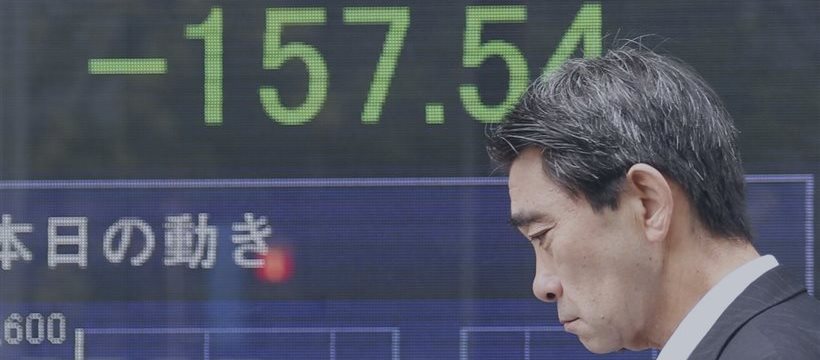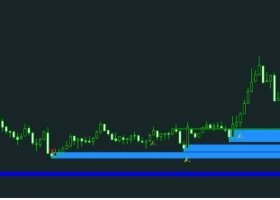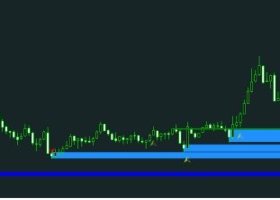
Asia Stocks Fall Ninth Day, Yuan Plunges, Bonds Climb Ahead of Fed
As Bloomberg reports, on Tuesday Asian stocks fell, with the regional index headed for its longest losing spell in more than a decade, and government bonds climbed in anticipation of the Federal Reserve reviews interest rates. The yuan slumped the most since March, metals dipped.
The MSCI Asia Pacific Index (MXAP) fell 0.3 percent by 2:35 p.m. in Tokyo, falling a ninth day. Nasdaq 100 Index futures were little changed after the U.S. gauge of technology stocks sank 1 percent in New York. Ten-year Australian notes rose for the first time in six days as the yield on 10-year Treasuries slipped two basis points. Gold rose 0.3 percent. China’s yuan fell as much as 0.25 percent in onshore trade after foreign-direct investment plunged to a four-year low.
Fed officials meet to review policy from today, with an unexpected decline in American factory output tempering speculation that the timeline for interest-rate increases could be brought forward. Today the Ministry of Commerce said that non-financial inbound investment in China in August fell 14 percent from a year earlier to $7.2 billion. Morning trading in Hong Kong was canceled because of a typhoon, while Australia’s central bank said it will monitor risks from rising property prices as policy makers reiterated a period of stability in record-low interest rates.
“The big issue is whether the Fed will change its forward guidance to indicate they are getting closer to the decision on putting interest rates up,” Stephen Halmarick, head of investment markets research at Colonial First State Global Asset Management, which oversees about A$170 billion ($154 billion), said by phone from Sydney. “The transition period as the Fed tightens will be difficult for markets in the Asian region. I think we are in for a few months of increased volatility in markets.”
Loss Spell
Nine of the 10 industry groups on the Asia-Pacific equity gauge retreated as the measure heads for its longest run of daily declines since June 2002. About five stocks fell for every three that advanced.
Japan’s Topix index declined 0.2 percent, snapping a five-day advance, while the Kospi gauge in Seoul added 0.4 percent. Australia’s S&P/ASX 200 Index fell 0.2 percent.
Hong Kong’s Hang Seng Index fluctuated with the Hang Seng
China Enterprises Index also swinging between gains and losses.
The Shanghai Composite Index was almost unchanged.
Trading on the Hong Kong Stock Exchange started at 1 p.m. local time after the morning session was scrapped due to Typhoon Kalmaegi, according to a statement on the exchange group’s website. The city’s third-highest storm signal was issued for the first time this year earlier today. Markets in Malaysia are closed for a holiday.
Dollar Index
The Bloomberg Dollar Spot Index pared early losses after after touching a 14-month high yesterday. The U.S. currency is up at least 0.5 percent against all 16 of its major peers this month, with the currencies of commodity exporters Brazil, Australia and Norway leading declines.
The U.S. central bank has been saying since March that interest rates would stay low for a “considerable time” after it completes the asset purchases known as quantitative easing. Speculation the Fed may bring forward rate increases has boosted the allure of the dollar this month and depressed Treasuries.
The yield on 10-year Treasury notes jumped 25 basis points, or 0.25 percentage point, this month through yesterday, heading for the biggest advance this year, as the Fed winds down asset purchases.
The rate on 10-year notes was 2.58 percent today. Yields on the notes dropped two basis points yesterday, falling for the first time in eight days to snap the bonds’ longest losing streak since June last year. Australian bonds due in a decade paid 3.62 percent, down two basis points from yesterday.
U.S. Factory Gauge
Yesterday data showed, U.S. factory production declined 0.1 percent in August from July, when it grew 0.4 percent. Analysts surveyed by Bloomberg predicted an increase of 0.3 percent.
The Nasdaq 100 dipped 1 percent to a one-month low, while the Russell 2000 tumbled 1.2 percent, the most since July 31, bringing its retreat in 2014 to 1.5 percent. The Standard & Poor’s 500 Index ended the U.S. day down 0.1 percent, with technology shares leading declines with a 0.6 percent drop. The Dow Jones Industrial Average added 0.3 percent as energy shares rebounded.
Selling in the U.S. was heaviest in stocks with the highest valuations. Facebook Inc. (FB) plunged 3.7 percent for the heftiest loss in the S&P 500. TripAdvisor Inc., Micron Technology Inc. and Netflix Inc. dropped at least 3.9 percent. Tesla Motors Inc. (TSLA) sank 9.1 percent for its worst day since May.
South Korea’s won added 0.2 percent to 1,036.1 per dollar, after weakening to a one-month low yesterday. The yen weakened 0.1 percent to 107.23 a dollar.


